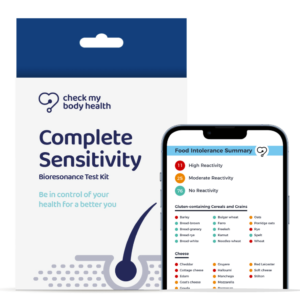Signs of a fast metabolism

Medically reviewed by GP Gareth James MBBS, DFFP, DRCOG, MRCGP on December 3, 2023. To give you technically accurate, evidence-based information, content published on the Check My Body Health blog is reviewed by credentialed professionals with expertise in medical and bioscience fields.

Some signs that may indicate a fast metabolism include:
Weight loss or difficulty gaining weight: A fast metabolism can cause the body to burn calories quickly, which can make it difficult for people to gain weight or cause them to lose weight even when eating a normal diet.
Increased appetite: People with fast metabolisms may feel hungrier than others because their body is using up their energy stores more quickly.
Elevated body temperature: A fast metabolism can raise the body’s core temperature, making people feel warm or sweaty even in cool environments.
Increased energy levels: People with fast metabolisms may have more energy and feel less fatigued than others.
Increased heart rate and breathing rate: A fast metabolism can cause the heart to pump faster and breathing to become more rapid.
More frequent bowel movements: The breakdown of food and its transit through the gastrointestinal track is increased with a fast metabolism, meaning it can cause an increase in bowel movements.
It is important to note that these signs alone can’t accurately determine whether someone has a fast metabolism. A proper medical evaluation, including blood tests to check hormone levels, would be necessary to determine one’s metabolism rate.
What is the cause of fast metabolism?
There are several factors that can cause a fast metabolism, including:
Genetics: Some people are genetically predisposed to having a faster metabolism, which means that their body naturally burns calories at a faster rate than others.
Muscle mass: Muscle tissue burns more calories than fat tissue, so people who have a higher percentage of muscle mass in their bodies will typically have a faster metabolism.
Thyroid function: The thyroid gland produces hormones that play a vital role in regulating metabolism. An overactive thyroid (commonly known as hyperthyroidism) is the most common cause for a sudden onset of developing a fast metabolism.
Chronic illness: Some medical conditions, such as hyperthyroidism, can cause the metabolism to speed up.
Medications: Some medications can also affect metabolism, such as certain antidepressants, and stimulants.
Age: Metabolism tends to decrease as we age, due to a reduction in muscle mass, and other physiological changes.
It’s also worth noting that a person’s lifestyle and daily habits can play a role in their metabolism rate. Eating a diet high in protein, regular exercise and having enough rest, can help keep the metabolism active.
What are the other signs of a fast metabolism?
Some signs that may indicate a fast metabolism include:
Weight loss or difficulty gaining weight: A fast metabolism can cause the body to burn calories quickly, which can make it difficult for people to gain weight or cause them to lose weight even when eating a normal diet.
Increased appetite: People with fast metabolisms may feel hungrier than others because their body is using up energy more quickly.
Elevated body temperature: A fast metabolism can raise the body’s core temperature, making people feel warm or sweaty even in cool environments.
Increased energy levels: People with fast metabolisms may have more energy and feel less fatigued than others.
Increased heart rate and breathing rate: A fast metabolism can cause the heart to pump faster and breathing to become more rapid.
More frequent bowel movements: Food is metabolised and moves through the body more quickly, it can cause an increase in bowel movements.
Excessive sweating: A fast metabolism generate more heat, which may in turn cause more sweating than normal.
Difficulty sleeping: Due to the body being active metabolically, it can be harder to fall asleep or stay asleep, leading to insomnia.
It is important to note that these signs alone can’t accurately determine whether someone has a fast metabolism. A proper medical evaluation, including blood tests to check hormone levels, would be necessary to determine one’s metabolism rate.
Is it good to have a fast metabolism?
Having a fast metabolism can have both positive and negative effects on a person’s health. Some potential benefits of a fast metabolism include:
Weight management: People with fast metabolisms may have an easier time maintaining a healthy weight, as they burn calories more quickly.
Increased energy levels: A fast metabolism can provide more energy throughout the day and less fatigue.
Better mood: A fast metabolism can regulate the release of hormones and chemical messengers in the body, which can help with mood stability.
On the other hand, a fast metabolism can also have some negative effects:
Difficulty gaining weight: People with fast metabolisms may struggle to gain weight or muscle mass, even with a healthy diet and exercise routine.
Nutrient deficiencies: People with fast metabolisms may be at risk of not getting enough nutrients from food, because they burn through them quickly.
Excessive sweating: A fast metabolism can generate more heat than usual and cause excessive sweating.
Difficulty sleeping: Due to a fast metabolism, it can make it harder to fall asleep or stay asleep, leading to insomnia.
A fast metabolism is not necessarily good or bad, but it could be beneficial for people who want to lose weight or manage their weight, but it may not be ideal for those who want to gain weight or build muscle mass. If you feel you need more information or guidance then seek professional guidance from a nutritionist on how to properly manage one’s metabolism rate and overall health.
How long does it take to get a fast metabolism?
It’s difficult to say exactly how long it will take for an individual to develop a fast metabolism, as it can depend on several factors, such as genetic predisposition, muscle mass, and overall health. However, there are some ways that people can potentially increase their metabolism over time:
Building muscle mass: Building muscle mass can help increase metabolism, as muscle tissue burns more calories than fat tissue. Resistance training such as weightlifting is the best way to build muscle mass.
Eating enough protein: Protein is important in maintaining muscle mass and can help increase metabolism over time.
Getting enough sleep and managing stress: Chronic lack of sleep and high levels of stress can lower metabolism, so getting enough sleep and managing stress levels can be beneficial.
Eating regularly and Eating more whole food: Eating regular meals, and making sure to include healthy whole foods in your diet can help keep your metabolism active.
It’s important to note that even with these efforts, it’s unlikely that a person’s metabolism will change significantly or quickly. Typically it may take several weeks or months to make changes and see results. We would recommend that you seek professional guidance from a trained nutritionist (or your Doctor if you have medical conditions that may be affected) before making any drastic changes to your diet or exercise routine.
References
- Ruggiero C, Ferrucci L. The endeavor of high maintenance homeostasis: resting metabolic rate and the legacy of longevity. J Gerontol A Biol Sci Med Sci. 2006;61(5):466-471.
- Cool Temperature Alters Human Fat and Metabolism. National Institutes of Health. URL. Accessed January 12, 2020.
- Sharma S, Kavuru M. Sleep and metabolism: an overview. Int J Endocrinol. 2010;2010:270832.



